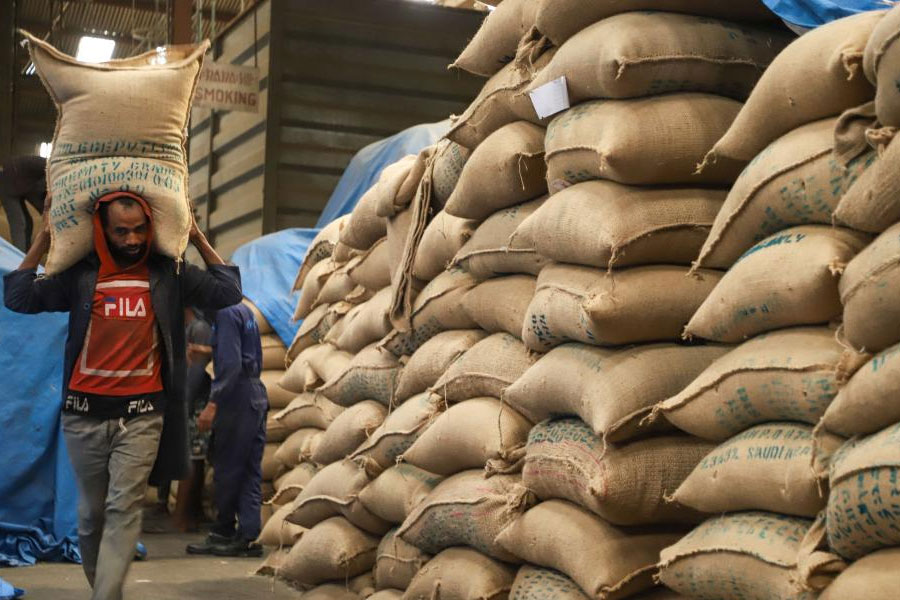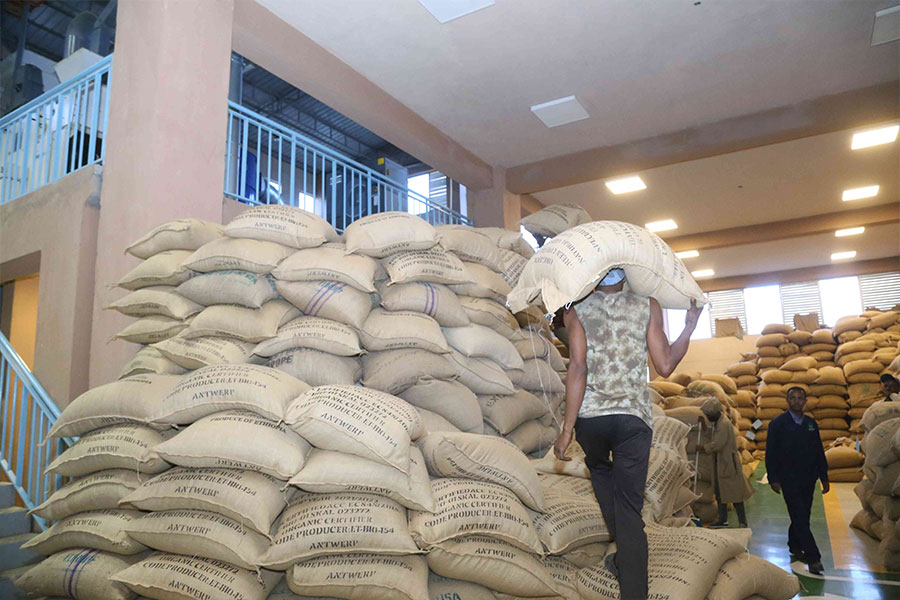
Fortune News | Dec 15,2024
Coffee destined for export will be traded based on weekly prices determined by the Ethiopian Coffee & Tea Authority. Effective last week, the authorities say the new rule aims to provide a "level-playing field" for exporters transacting through the Ethiopian Commodities Exchange (ECX) and those sourcing the beans through vertical integration.
The directors of the Exchange (ECX) decided last week, hoping to improve the prices farmers receive for the coffee beans.
Yinager Dessie (PhD), governor of the National Bank of Ethiopia (NBE), serves as ECX chairperson, overseeing an 11-member board. Six members are appointed by the Ministry of Trade & Regional Integration, while five are representatives of the private sector.
The Authority sends a price list to the ECX each week to align coffee prices sourced through vertical integration and traded at the Exchange, according to Shafi Umer, deputy director-general of the Coffee & Tea Authority. Established in 2008, the Authority is a federal agency responsible for promoting the coffee, tea and spice industries.
A team of experts at the Authority convene daily to compare local prices with international rates and use a weighted average method to set the minimum threshold for exports. The New York Arabica coffee price indicator computed by the International Coffee Organisation (ICO) serves as a reference.
“It's a good thing ECX decided to use the price list as a reference,” said Shafi.
The ECX has come a long way since its launch in 2008 under the stewardship of Eleni Gebremedhin (PhD). It started operations with sesame as the primary commodity traded on its floor. Coffee was integrated into the system the following year. Since then, it has grown its portfolio to include 15 commodities and accrued 347 members.
It is a spot exchange, where participants settle prices upfront. However, it uses a price flooring scheme, a globally common practice used to limit the value of coffee from dropping past a certain point.
The Exchange trades around 25 different coffee varieties spot contracts, including popular brands such as Sidama, Yirgacheffe, Jimma and Harar. Close to 3.5 million small-scale farmers sell their commodities through the Exchange, a little over half the six million engaged in growing coffee on 650,000hct of land.
Ethiopia, the fifth-largest coffee producer and exporter globally, shipped 271,000tn of coffee abroad last year, generating 854 million dollars. Sixty percent of the total export volume was transacted through the ECX. However, the volume of coffee traded at the ECX has been declining since the introduction of a vertical integration modality by the Authority in 2017. The scheme allows exporters to source the beans directly from farmers and suppliers.
Exporters say the falling volume is due to problems with the quality of coffee traded at the Exchange. Industry players have complained about the quality monitoring system implemented at ECX warehouses, forcing them to receive subpar produce. ECX offers an integrated warehouse system that assigns grades and standards for each commodity traded on its floor. However, guaranteeing the quality of coffee and tracking the beans from a particular location to a warehouse remains challenging.
Getachew Zeleke is a coffee exporter who holds a membership seat at the Exchange. Until two years ago, he depended on the ECX to source the cash crop. He switched to the vertical integration model last year. This year, he shipped 120 containers of coffee sourced through vertical integration to Japan and Europe. It is part of the 40pc of the 271,000tn of coffee sent last year through vertical integration.
“Although the price is slightly higher, it is worth it considering the quality,” said Getachew, one of the 418 licensed coffee exporters.
Buyers and sellers transact under vertical integration adding a five percent premium on the minimum price set by the Authority.
“It's to encourage farmers to supply quality beans,” said Shafi.
Experts from the Authority monitor coffee quality through the 13,000 centres it operates. Export-standard coffee prices in the domestic market are growing because exporters are willing to spend more to ship the cash crop and earn foreign currency, which they use to pay for imports, according to Sewale Abate (PhD), lecturer of finance and investment at the Addis Abeba University.
“This pushes the prices of coffee on the domestic market above the price in the international market," said Sewale.
According to the International Coffee Organisation, the average price of a kilogramme of coffee from Ethiopia goes for around five dollars. A kilo of export-standard coffee sells for about six dollars in local markets, excluding additional transportation and overhead costs.
Netsanet Tesfaye, corporate communications manager of the ECX, argues that the Exchange sets the minimum price based on the prevailing market.
“ECX has the mandate to set its prices," he told Fortune.
He is echoing the laws that grant the Exchange the authority to set its own rules for self-governance for operations such as management, trading, warehousing, clearing and settlement. Previously, the Ministry of Trade & Regional Integration set the minimum price for oilseeds and cereals. The Exchange determines these prices now.
PUBLISHED ON
Apr 16,2022 [ VOL
23 , NO
1146]

Fortune News | Dec 15,2024

Fortune News | Apr 09,2022

Fortune News | Aug 26,2023

Radar | Dec 05,2018

Radar | Apr 17,2021

Radar | Sep 18,2023

Fortune News | Feb 27,2021

Agenda | Oct 13,2024

Radar | Jul 13,2024

Radar | Oct 05,2019

Dec 22 , 2024 . By TIZITA SHEWAFERAW
Charged with transforming colossal state-owned enterprises into modern and competitiv...

Aug 18 , 2024 . By AKSAH ITALO
Although predictable Yonas Zerihun's job in the ride-hailing service is not immune to...

Jul 28 , 2024 . By TIZITA SHEWAFERAW
Unhabitual, perhaps too many, Samuel Gebreyohannes, 38, used to occasionally enjoy a couple of beers at breakfast. However, he recently swit...

Jul 13 , 2024 . By AKSAH ITALO
Investors who rely on tractors, trucks, and field vehicles for commuting, transporting commodities, and f...

Oct 25 , 2025
The regulatory machinery is on overdrive. In only two years, no fewer than 35 new pro...

Oct 18 , 2025
The political establishment, notably the ruling party and its top brass, has become p...

Oct 11 , 2025
Ladislas Farago, a roving Associated Press (AP) correspondent, arrived in Ethiopia in...

Oct 4 , 2025
Eyob Tekalegn (PhD) had been in the Governor's chair for only weeks when, on Septembe...